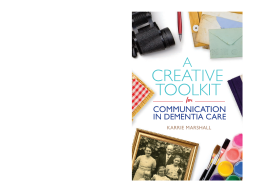
Additional Information
Book Details
Abstract
How can carers and relatives support a person's identity, relationships and emotional wellbeing through changes that occur in the later stages of dementia?
Drawing on over ten years' experience of working with people with dementia, Karrie Marshall provides a toolkit of tried and tested creative activities to support communication and relationships. Activities are vast and varied, with outdoor activities such as bird-watching and star-gazing aimed at supporting physical health, artistic activities such as collage creation to support identity, and musical activities such as sounds and voice warm-ups to support self-expression.
Marshall also sensitively covers end of life care for people with dementia, explaining how emotional support can be provided through gentle breathing activities and even puppetry, as well as covering the legal importance of power of attorney.
This book offers a different perspective in caring for those with dementia. Through a creative approach the author shows how it is possible to make connections and build relationships, with and without words. The process is described step-by-step, making it a valuable resource for anyone involved or interested in this field of work.
Julie Simmons, Adult Learning Strategy Officer, High Life Highland, Inverness
This book is outstanding-worth buying, worth borrowing from the library, worth reading carefully.
Bob Kahn
Bob’s Books
Each person's experience of dementia is unique. This book, based on many years of first-hand experience, will help us all to find our own unique way to use creative approaches in caring. It will be an invaluable resource to support and inform our work.
Keith Walker, Executive Director, Befrienders Highland Ltd
A Creative Toolkit for Communication in Dementia Care is a valuable resource for caregivers. You'll learn important tips for connecting and better communication with someone who has dementia. The book is inspirational, practical, and educational. It demonstrates how creative communications in caregiving can support the well-being of people with dementia.
Berna Huebner, Founder and Director, Hilgos Foundation
As a person with dementia I know many of my peers will lose the ability to verbally communicate, but that does not mean we lose our intelligence. It is pleasing to know that the importance of non-verbal language is highlighted in this book. Ignorance, social isolation and boredom are issues we face. But by following the great advice in this book you will have the necessary toolkit to give people every opportunity to communicate and take part in worthwhile physical and mental activities that will bring hours of enjoyment for the person with dementia and, just as importantly, you the carer.
Tommy Dunne, person living with dementia
Karrie Marshall has a background in nursing and person-centred counselling. She managed a care home for people with profound and complex needs, and worked for ten years as a lecturer in health and social care at Inverness College. In 2011 she founded the social enterprise Creativity in Care (www.creativityincare.org), which promotes inclusive and joyful work in care settings and in the community for people living with dementia and people who use mental health and learning disability services. She is also the author of Puppetry in Dementia Care: Connecting through Creativity and Joy, also published by JKP. Karrie lives in Inverness, Scotland.
